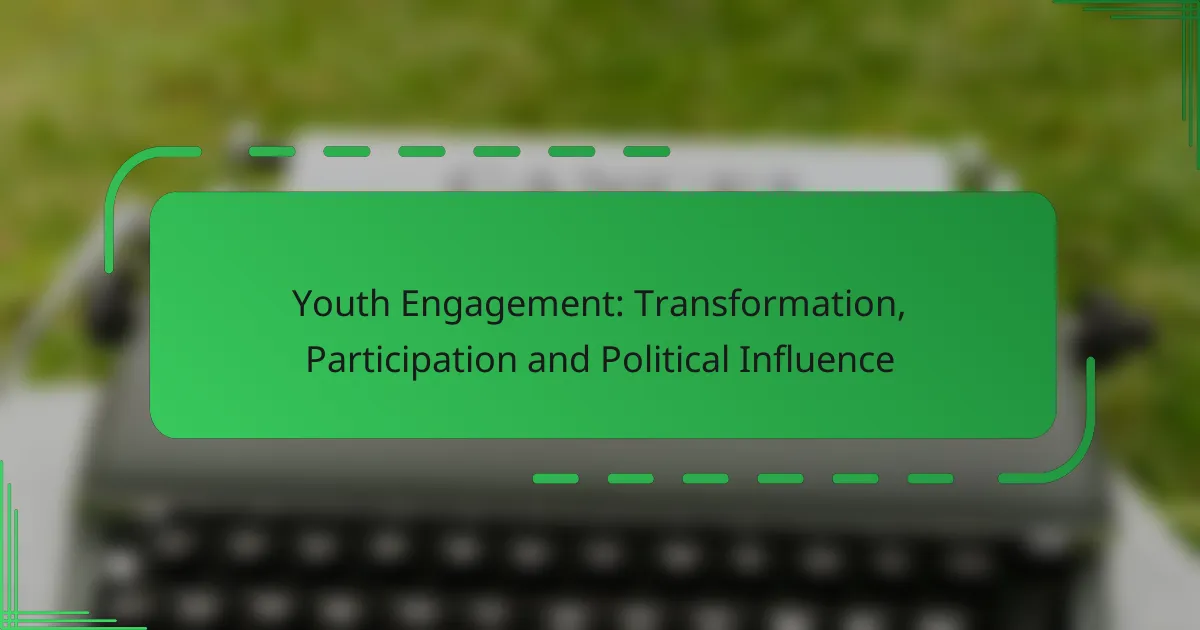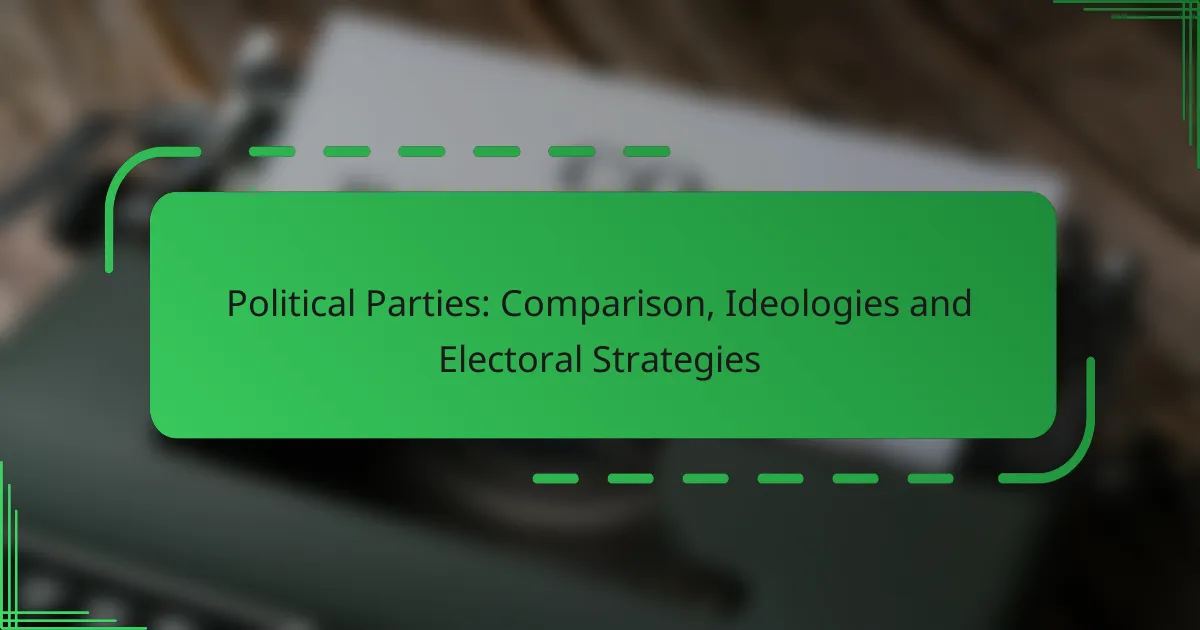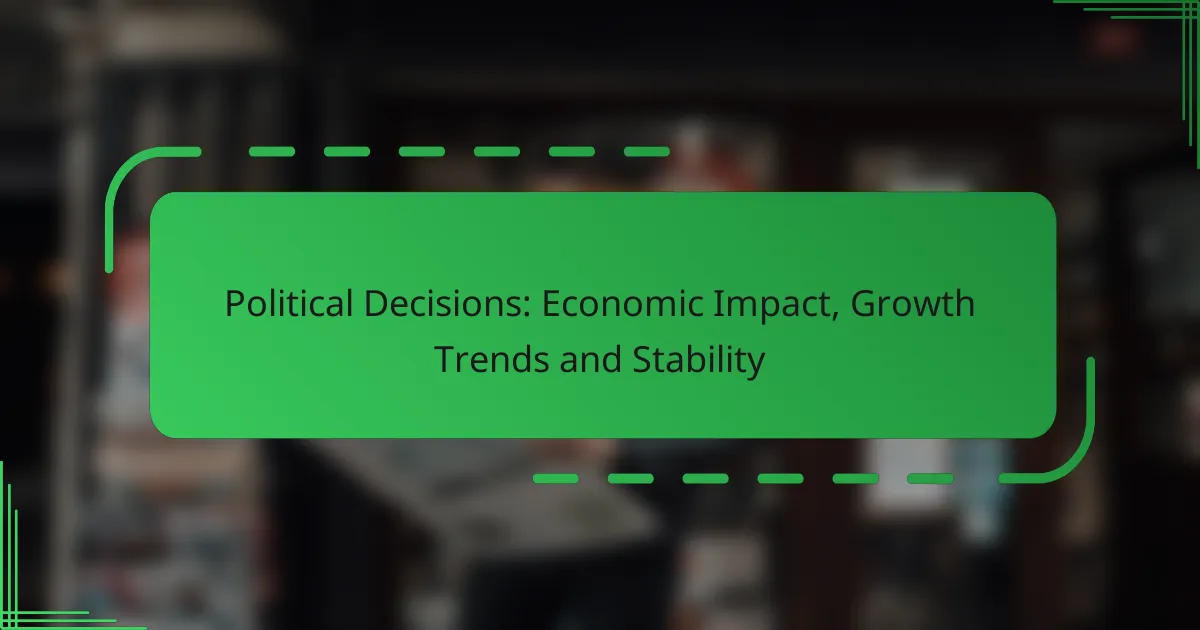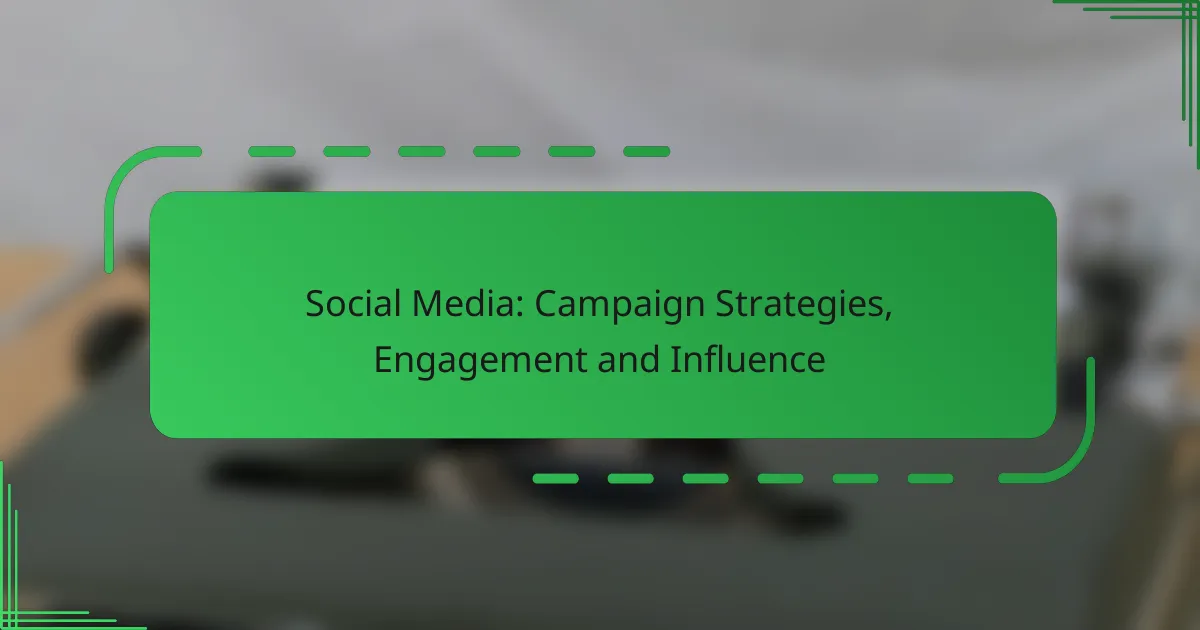Youth engagement in political processes is crucial for fostering a generation that actively participates in democracy. By voting, organizing communities, and advocating for relevant issues, young individuals can significantly influence decision-making at various levels. However, they face challenges such as limited resources and barriers to voting that can impede their participation. Overcoming these obstacles is essential for empowering youth and enhancing their representation in shaping policies that impact their lives and communities.
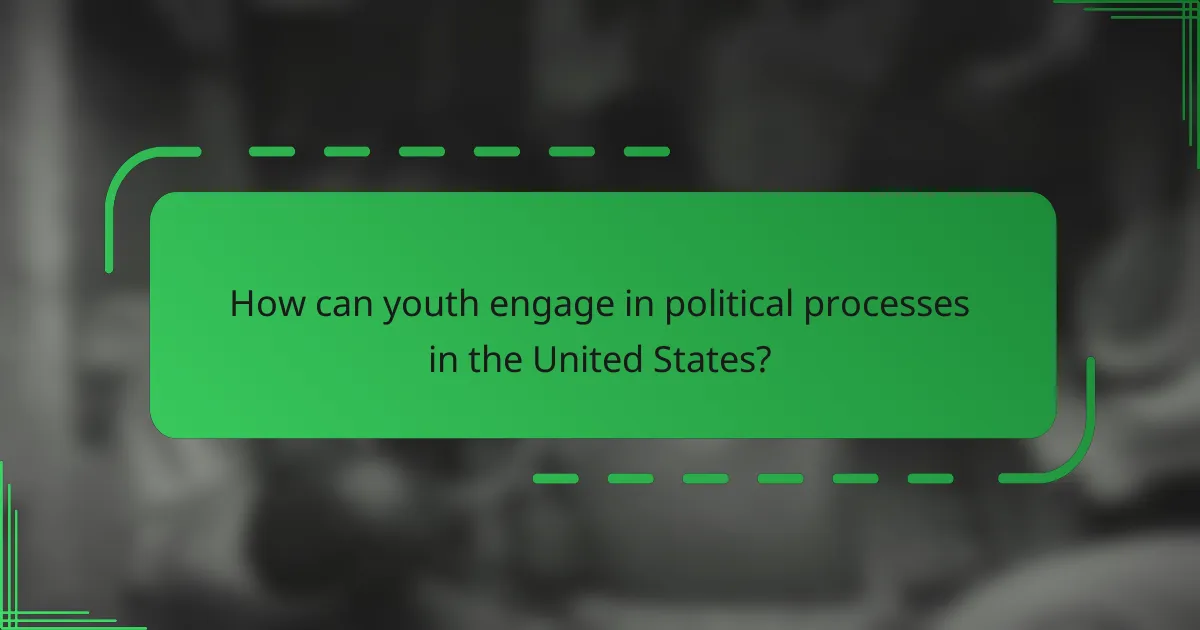
How can youth engage in political processes in the United States?
Youth can engage in political processes in the United States through various methods, including voting, organizing communities, and advocating for issues that matter to them. These activities empower young people to influence decision-making and policy development at local, state, and national levels.
Voting initiatives
Voting initiatives are essential for youth engagement, as they provide opportunities for young people to participate in elections. Many states offer programs aimed at increasing voter registration among young citizens, often targeting high schools and colleges.
To effectively engage in voting initiatives, youth should familiarize themselves with registration deadlines, voting locations, and the electoral process. Participating in local campaigns or initiatives can also help raise awareness and encourage peers to vote.
Community organizing
Community organizing involves mobilizing individuals to address local issues and advocate for change. Young people can take the lead in organizing events, forums, or discussions that highlight community concerns and promote civic engagement.
Effective community organizing requires building relationships and networks within the community. Youth can collaborate with local organizations, attend town hall meetings, and create action plans to tackle specific issues that resonate with their peers.
Advocacy campaigns
Advocacy campaigns allow youth to champion causes they care about, from climate change to education reform. These campaigns can take various forms, including petitions, rallies, and lobbying efforts directed at policymakers.
To run a successful advocacy campaign, youth should identify clear goals, develop a strategy, and utilize various platforms to spread their message. Engaging with local leaders and leveraging community support can amplify their efforts and drive change.
Social media activism
Social media activism is a powerful tool for youth engagement, enabling young people to raise awareness and mobilize support for issues quickly. Platforms like Twitter, Instagram, and TikTok can be used to share information, organize events, and connect with like-minded individuals.
To maximize impact, youth should create compelling content that resonates with their audience and encourages participation. Using hashtags and collaborating with influencers can help broaden the reach of their messages and foster a sense of community.
Peer education programs
Peer education programs empower youth to educate their peers about important political and social issues. These programs can focus on topics like voter rights, civic responsibility, and community resources, fostering informed and engaged citizens.
To implement a peer education program, youth should identify relevant topics, develop engaging materials, and create interactive sessions. Collaborating with schools or community organizations can enhance the program’s effectiveness and reach a wider audience.
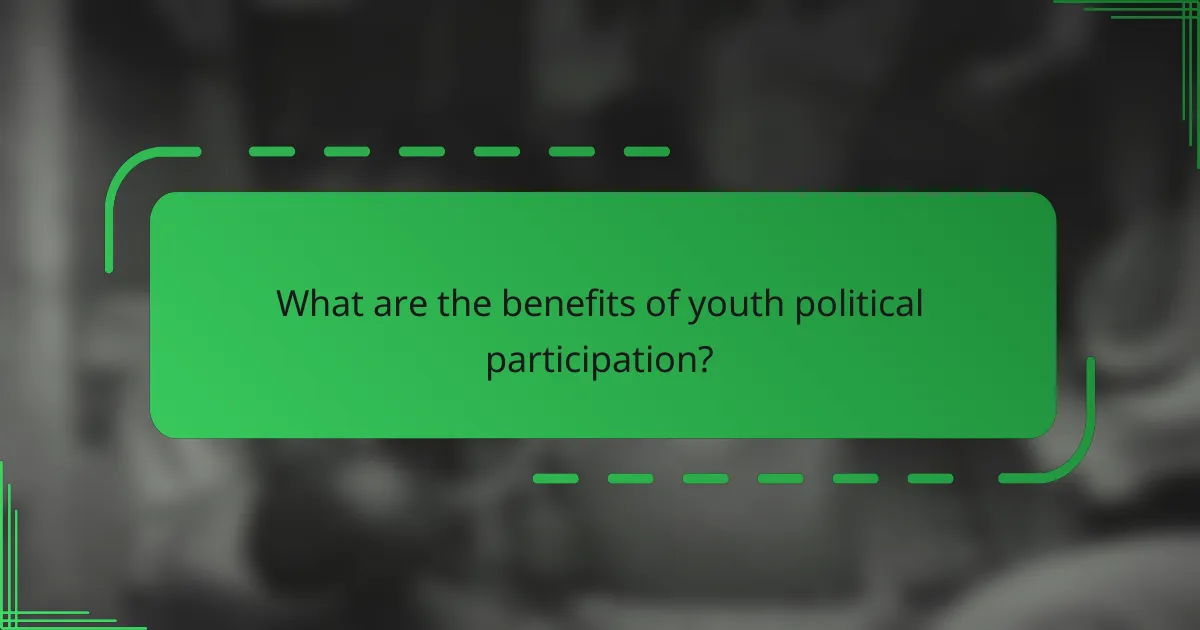
What are the benefits of youth political participation?
Youth political participation offers numerous benefits, including fostering a sense of empowerment and agency among young individuals, increasing their representation in decision-making processes, and enhancing their civic skills. Engaging in political activities allows youth to influence policies that affect their lives and communities.
Empowerment and agency
Political participation empowers youth by giving them a voice in matters that impact their future. When young people engage in discussions and decision-making, they develop a sense of ownership over their lives and communities. This empowerment can lead to increased confidence and a stronger commitment to civic engagement.
For example, youth-led initiatives often address local issues, such as environmental concerns or education reform, allowing young people to advocate for changes that reflect their values and needs. This active involvement fosters a culture of participation that can inspire others to join in.
Increased representation
Involving youth in political processes ensures that their perspectives and interests are represented in governance. When young people participate, they can influence policies that directly affect their demographic, such as education, employment, and social justice. This representation is crucial for creating equitable policies that benefit all age groups.
Countries with active youth participation often see a more diverse range of voices in political discussions, leading to more comprehensive solutions. For instance, youth councils or advisory boards can serve as platforms for young people to express their views and contribute to policy-making.
Development of civic skills
Political participation helps youth develop essential civic skills, such as critical thinking, public speaking, and teamwork. These skills are vital for effective engagement in democratic processes and can enhance their employability in the future. By participating in campaigns, debates, or community organizing, young people gain practical experience that prepares them for future leadership roles.
Moreover, educational programs that focus on civic engagement can equip youth with the knowledge needed to navigate political systems. Workshops on advocacy and negotiation can further enhance their ability to influence change within their communities.
Influence on policy
Youth participation can significantly influence policy decisions, especially on issues that resonate with younger generations. When young people mobilize around specific causes, they can draw attention to critical issues and advocate for legislative changes. This influence is often amplified through social media, where youth can quickly organize and spread their message.
For instance, movements focused on climate change have seen substantial youth involvement, leading to policy discussions at national and international levels. Engaging in these movements allows young people to not only voice their concerns but also to propose actionable solutions that can lead to meaningful change.
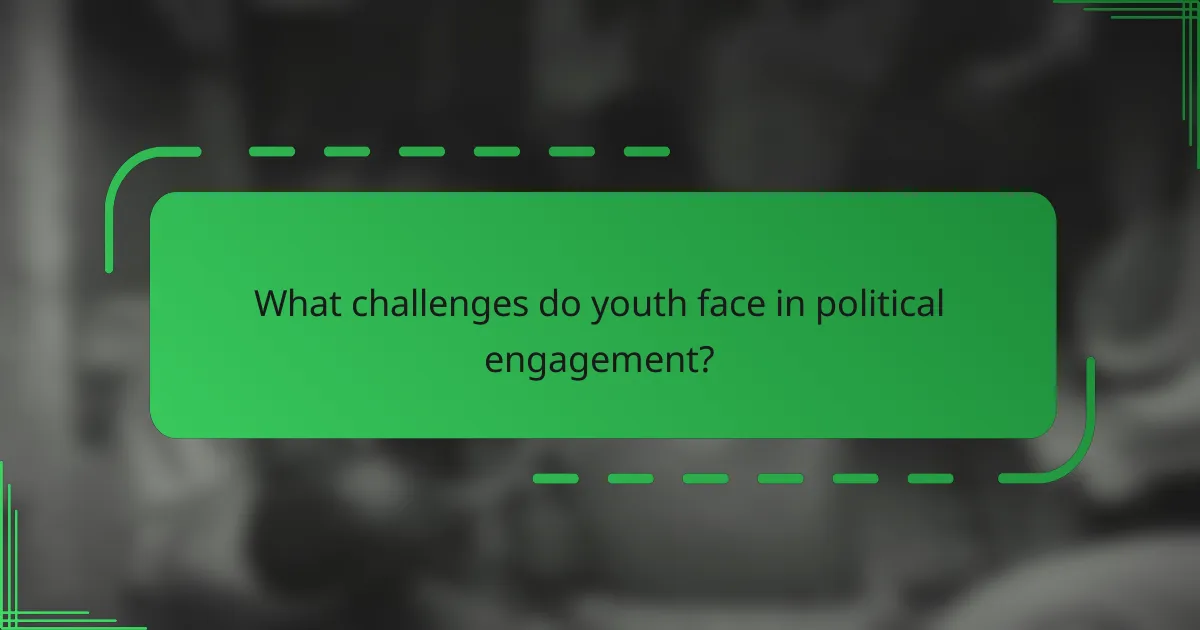
What challenges do youth face in political engagement?
Youth encounter several significant challenges in political engagement, including limited access to resources, political apathy, barriers to voting, and the spread of disinformation. These obstacles can hinder their ability to participate effectively in the political process and influence decision-making.
Lack of access to resources
Many young people struggle with a lack of access to essential resources that facilitate political engagement, such as information, funding, and mentorship. Without these resources, it becomes difficult for youth to understand political processes or mobilize effectively.
For instance, youth organizations often rely on grants and donations, which may not be readily available. This financial barrier can limit their ability to host events, campaigns, or outreach programs that encourage political participation.
Political apathy
Political apathy among youth is a significant barrier to engagement, often stemming from feelings of disillusionment or a belief that their voices do not matter. Many young individuals perceive politics as irrelevant to their daily lives, leading to a lack of motivation to participate.
To combat apathy, initiatives that connect political issues to youth interests—such as climate change or education reform—can be effective. Engaging youth in discussions about how policies directly affect them may help spark their interest and encourage active participation.
Barriers to voting
Barriers to voting can significantly impact youth participation in elections. These barriers may include strict voter ID laws, limited access to polling places, and complicated registration processes. In some regions, young voters may also face challenges due to their transient living situations, such as those in college.
To improve voting access, advocacy for simplified registration processes and increased availability of polling locations is crucial. Educating youth about their voting rights and providing resources to navigate the voting process can also empower them to participate more fully.
Disinformation
The proliferation of disinformation poses a serious challenge to youth political engagement. Misinformation can skew perceptions of political issues and candidates, leading to confusion and disengagement. Young people, who often rely on social media for news, are particularly vulnerable to misleading information.
To combat disinformation, promoting media literacy programs that teach critical thinking and fact-checking skills is essential. Encouraging youth to verify sources and seek diverse perspectives can help them make informed decisions and engage more confidently in political discussions.
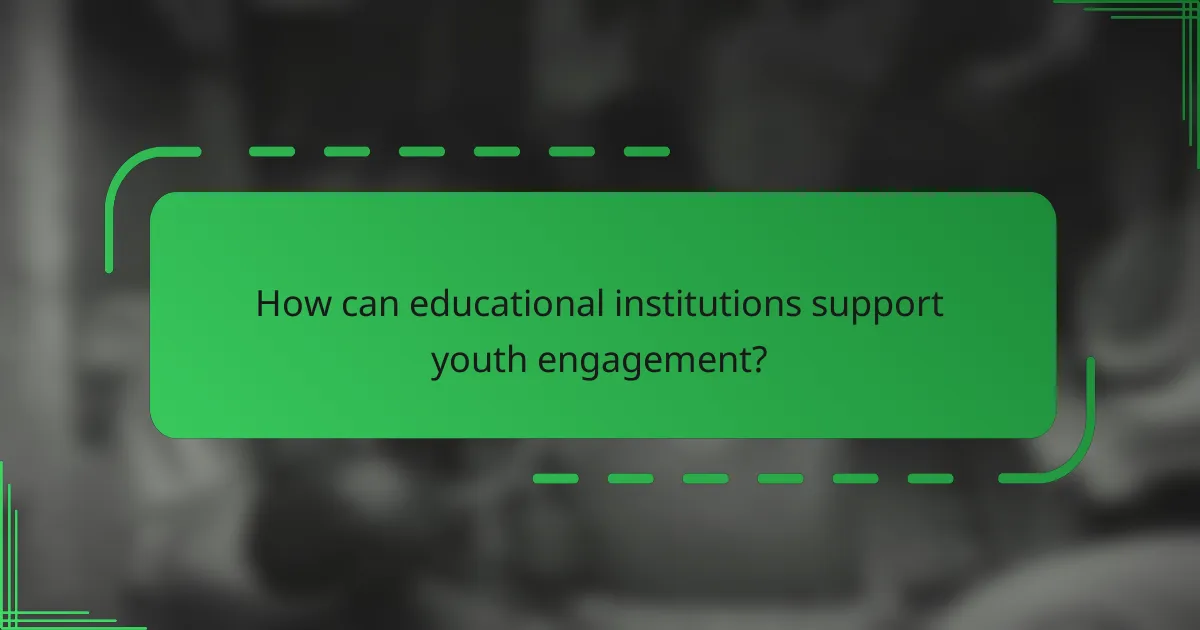
How can educational institutions support youth engagement?
Educational institutions can play a crucial role in fostering youth engagement by providing resources, programs, and opportunities that encourage active participation in civic life. By integrating civic education, forming partnerships, and offering internships, schools can empower students to become informed and active citizens.
Civic education programs
Civic education programs are essential for teaching students about their rights and responsibilities as citizens. These programs can include courses on government structure, the electoral process, and the importance of civic participation.
Institutions should aim to make civic education interactive, incorporating debates, simulations, and community projects to enhance learning. Engaging students through real-world applications helps them understand the impact of their involvement.
Partnerships with local organizations
Forming partnerships with local organizations can significantly enhance youth engagement by providing students with access to resources and expertise. Collaborations with nonprofits, community groups, and local government can create opportunities for students to participate in civic activities.
These partnerships can facilitate workshops, volunteer opportunities, and mentorship programs that connect students with community leaders. Educational institutions should actively seek out and maintain these relationships to enrich their students’ experiences.
Internship opportunities
Internship opportunities allow students to gain practical experience in civic engagement and public service. Schools can develop programs that connect students with internships in local government offices, advocacy groups, or civic organizations.
Offering guidance on how to apply for internships and providing support during the application process can help students navigate these opportunities. Schools should encourage students to pursue internships that align with their interests and career goals, fostering a deeper commitment to civic involvement.
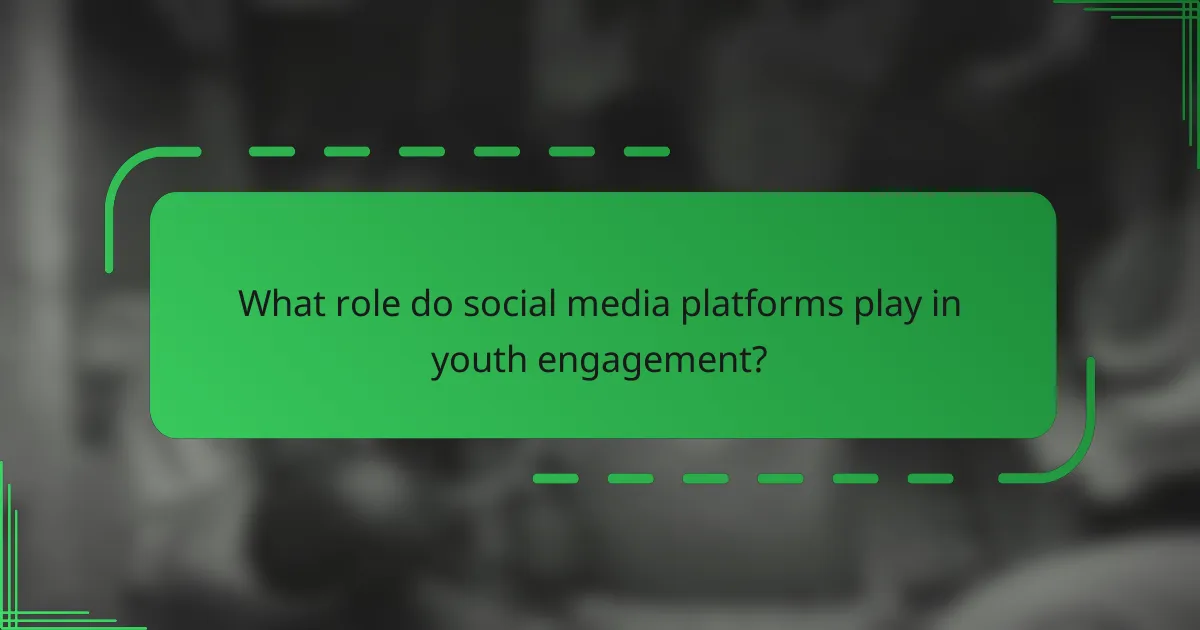
What role do social media platforms play in youth engagement?
Social media platforms are crucial for youth engagement as they provide spaces for young people to express their opinions, mobilize for causes, and connect with peers. These platforms facilitate real-time communication and allow youth to participate in political discussions and activism on a global scale.
Facilitating communication
Social media enables instant communication among youth, breaking down geographical barriers and allowing for the exchange of ideas. Platforms like Twitter, Instagram, and TikTok serve as venues for discussions on social issues, where young voices can be amplified and heard.
Engagement through social media often leads to organized movements, such as climate strikes or social justice campaigns. For instance, hashtags can quickly mobilize support and spread awareness, demonstrating the power of collective action in a digital age.
To effectively use social media for engagement, youth should focus on clear messaging and authentic interactions. Avoiding misinformation and fostering respectful dialogue are key to maintaining productive conversations and building a supportive community online.
